Notion is a versatile all-in-one workspace that can revolutionize the way you manage your freelance business. In this ultimate guide, I’ll walk you through the steps to harness the power of Notion and boost your productivity!
Getting Started With Notion As A Freelancer
First things first, let’s start by getting acquainted with Notion. Think of Notion as your digital Swiss Army Knife, a single tool that can handle a multitude of tasks. It’s a combination of a note-taking app, a project management tool, a database, and more. All rolled into one intuitive platform.
Notion’s flexibility lets you design a workspace that suits your unique needs as a freelancer, and there are countless ways to optimize it.
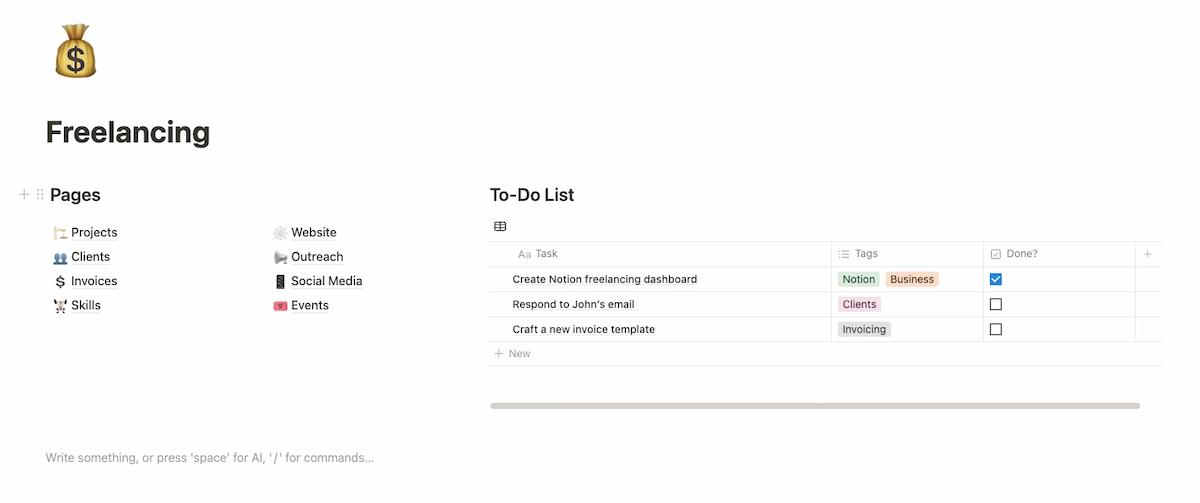
To get started with Notion, the first step is to create an account. You can sign up for a free Notion account and explore its features right away. Once you’re in, take some time to familiarize yourself with the different elements of the workspace.
How Notion’s Page System Works
Notion is organized into pages, which can contain various types of content, such as text, tables, calendars, and even more pages. You can organize these pages into a hierarchical structure. So you can create different sections and subpages for different aspects of your freelance business.
Notion offers a range of templates and blocks to help you get started. Templates are pre-designed layouts that you can easily customize to fit your specific needs.
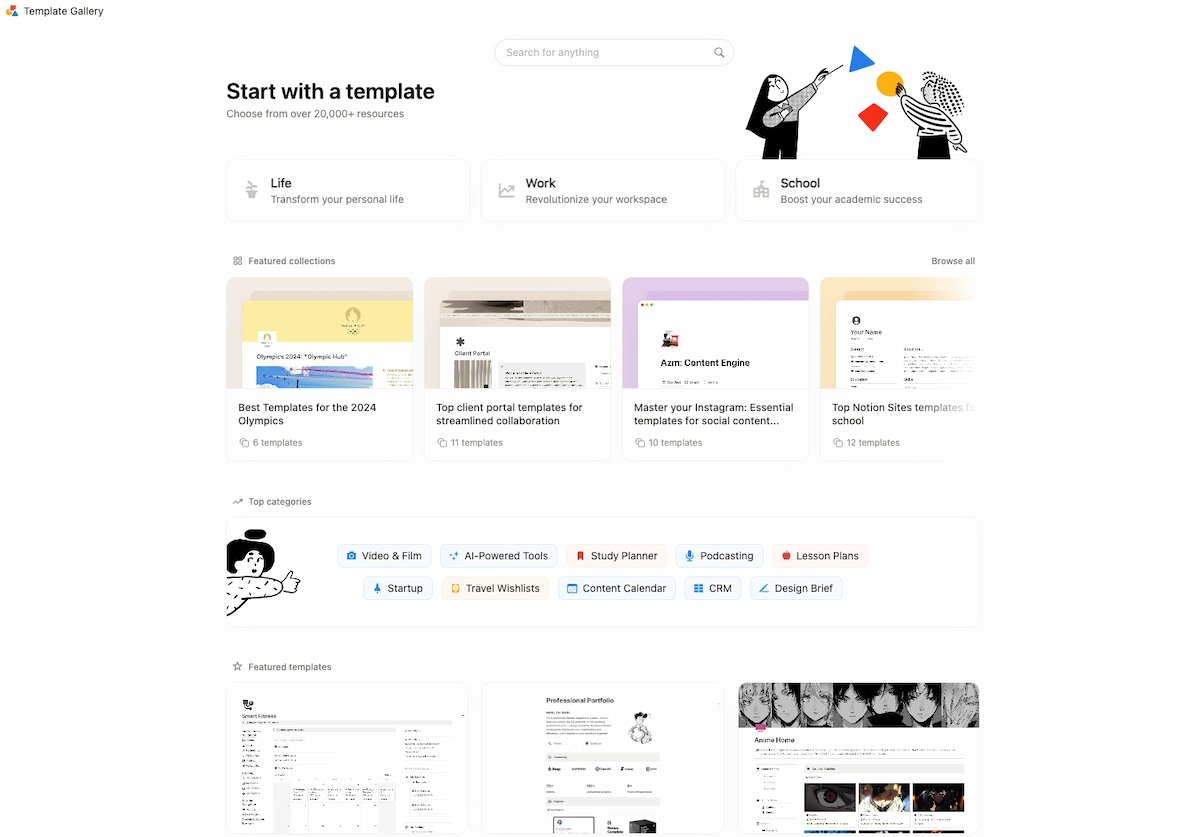
Blocks, on the other hand, are individual units of content that you can add, rearrange, and modify within your pages.
You can use templates as a starting point and add blocks to tailor your workspace to your exact requirements. Think of it as a blank canvas where you can build your ideal freelance workspace.
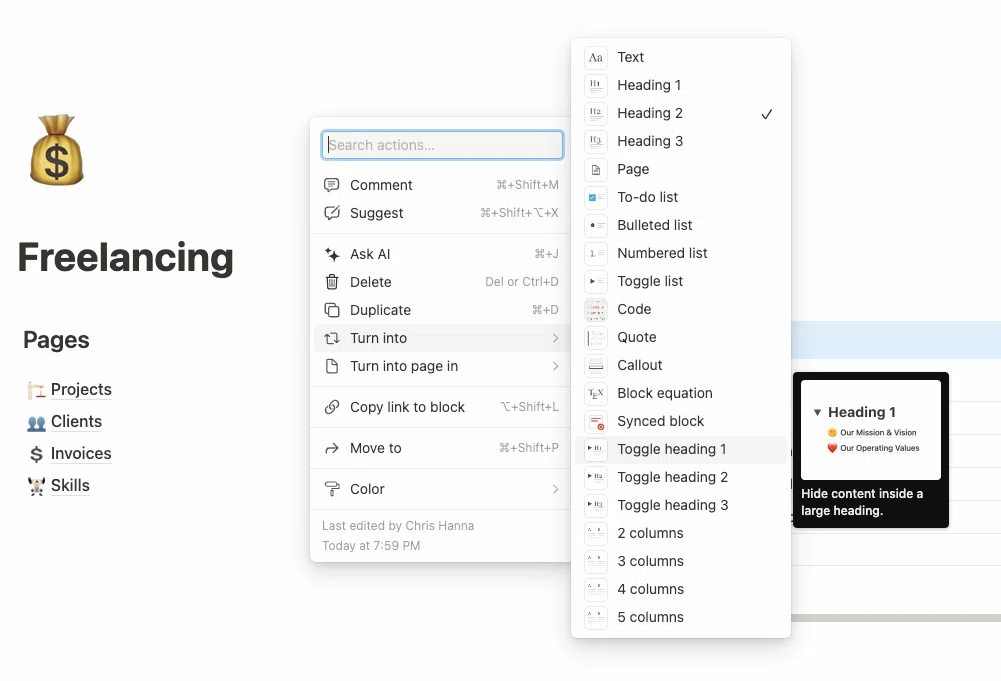
There are templates built into Notion itself, but there are also lots of user-generated options out there. Check out my list of the best Notion templates for freelancers for more details.
Why Notion Is Great For Freelancers
As a freelancer, project management is a crucial aspect of your business. Notion excels in this area, providing you with the tools to plan, track, and collaborate on your projects seamlessly.
You can create project management boards using Kanban-style layouts, where you can visually track the progress of your tasks from “To Do” to “Completed.” Or to track your client outreach progress, like this:

Notion also allows you to assign tasks, set deadlines, and collaborate with clients or team members in real-time. With project management in Notion, you’ll never miss a beat and can deliver your projects on time, every time.
Note: I don’t personally use it for this purpose, and tend to stick to using it for managing my own tasks. But I imagine many freelancers would find this functionality super useful.
The second main benefit of Notion in general, not just for freelancers, is the organizational capability. Notion’s ability to organize information is a game-changer for freelancers. You can create databases to store client information, track expenses, or manage your content calendar.
Databases are highly customizable too. You can define custom fields and sort data with ease.
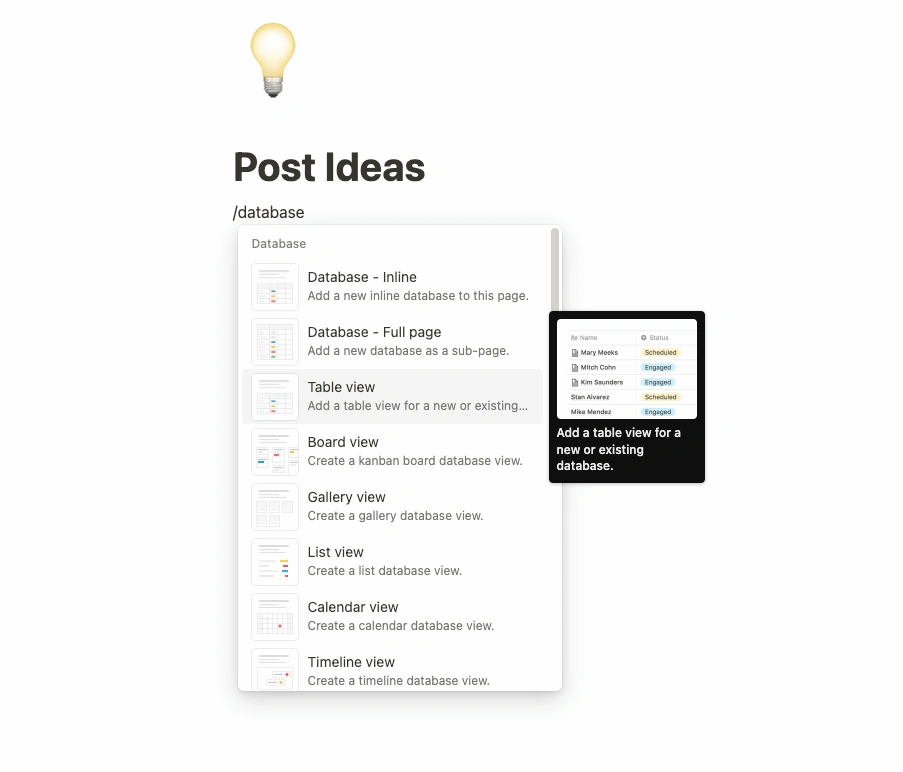
Let’s look at more specific examples of how you can use Notion as a freelancer.
What Can You Use Notion For As A Freelancer?
Project Management
Notion offers powerful project management capabilities that can help you stay organized and on top of your tasks. Create project boards, assign tasks, set deadlines, and track progress with ease.
Visualize your projects using Kanban boards or even just simple tables. So you can have a clear overview of your projects and their timelines.

Task Tracking & Time Management
Keeping track of your tasks and managing your time effectively are essential for freelancers. Notion provides features to create to-do lists, set reminders, and even track your time.
You can use Notion’s built-in time tracking capabilities or integrate it with third-party time tracking apps to log your billable hours accurately. And there are user-generated templates you can use too.
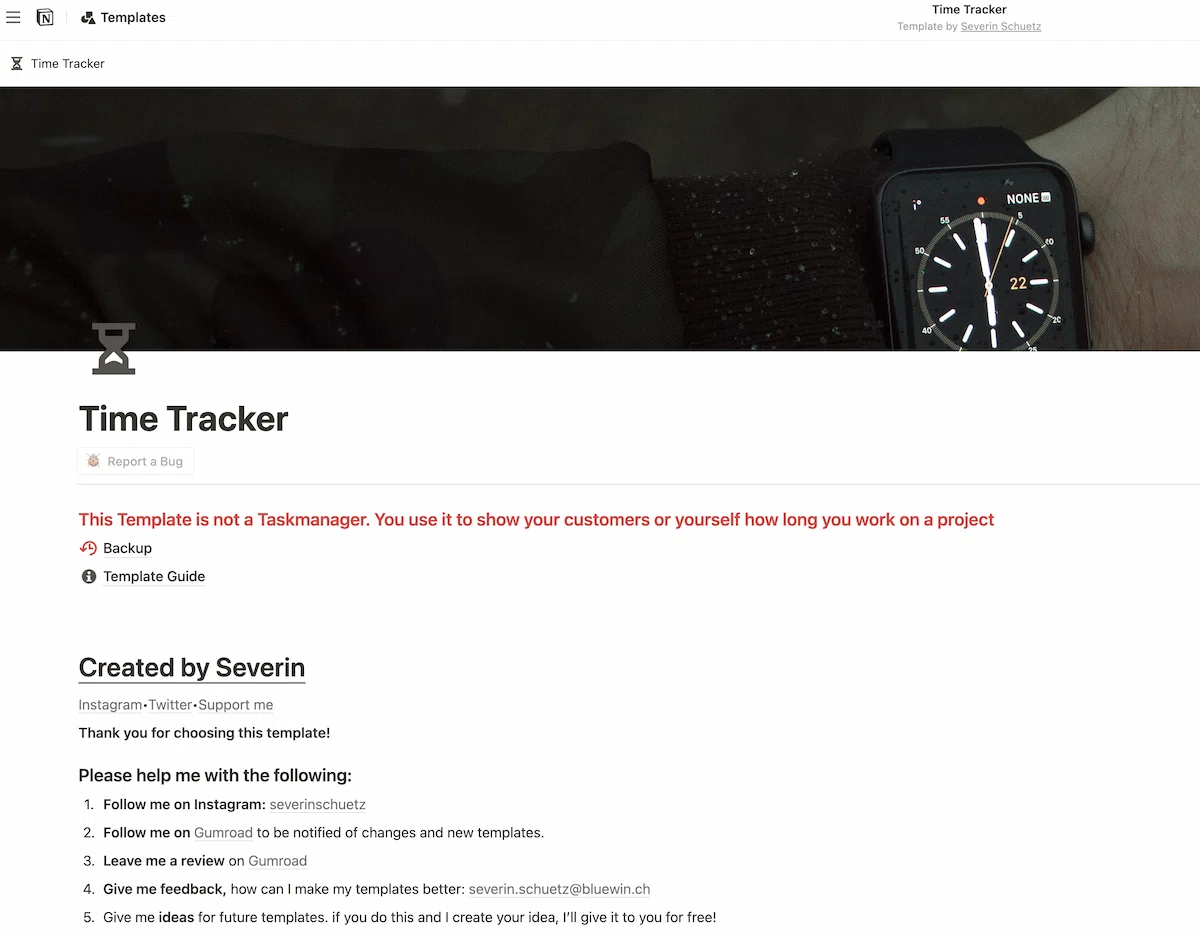
Client & Contact Management
As a freelancer, managing client relationships and their contact information is crucial. Notion can serve as your client database. You can store and organize client details, project histories, and contact information in one centralized place.
You can create custom fields to capture relevant information, such as client preferences or project specifications.
Notion also allows for collaboration on the platform itself. So, if your clients are open to using Notion for your interactions, it can serve as an effective way to communicate and manage projects.

Content Creation & Editorial Calendar
If you’re a freelance content creator, Notion can be your go-to tool for planning and organizing your content strategy. You can use Notion to create an editorial calendar where you can map out your content ideas, plan publication dates, and track your progress.
Collaborate with editors or clients by sharing content drafts and receiving feedback. Notion’s flexibility really allows you to adapt the content creation workflow to your specific needs.
Expense Tracking & Invoicing
Notion can also help you track your expenses, record income, and create invoices. You can create a comprehensive financial tracker to log your business expenses and categorize them.
You can also generate professional-looking invoices using Notion’s templates and customize them to reflect your brand.

These are just a few examples of what you can use Notion for as a freelancer. The beauty of Notion lies in its versatility, allowing you to adapt it to your specific needs and preferences.
Using Notion Freelance Templates
Finally, a word on Notion’s templates.
Notion offers a treasure trove of pre-designed templates inside the platform itself. These templates can serve as a starting point for organizing various aspects of your freelance business.
Whether you’re just starting out or looking to revamp your existing workflow, Notion templates can be incredibly beneficial. But you don’t just have to use the ones built into Notion. There are lots of free and paid Notion freelancing templates out there created by the community.
Why Use Notion Freelance Templates?
First and foremost, templates can save you a lot of time and effort. Instead of starting from scratch, you can leverage the expertise of others who have designed these templates with freelancers in mind.
Templates provide a ready-made structure and layout, which you can customize to fit your specific requirements.
These templates often incorporate proven workflows and useful features that can help you optimize your operations and stay productive. Without having to learn how to use many of Notion’s often confusing features. There are even full Notion freelance dashboards, like this one:
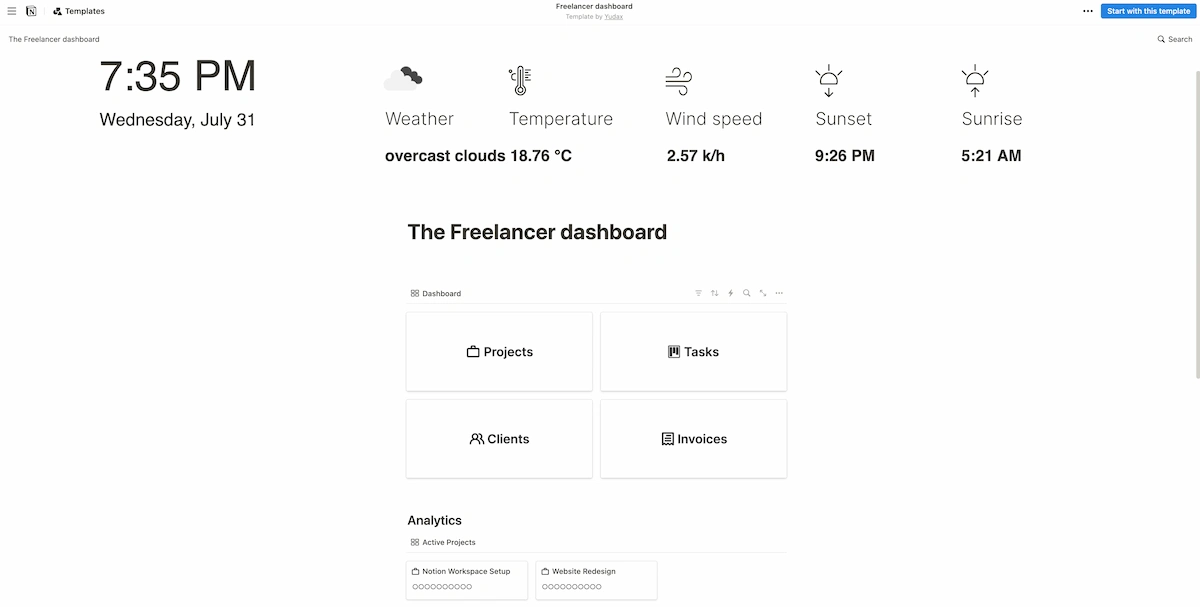
With templates, you can benefit from the knowledge and insights of others within the freelance community and save a lot of time and effort!
How Will You Use Notion As A Freelancer?
I use Notion for much of my business and my personal life too. And it has been super useful for me as a freelancer.
You can try Notion for yourself here.
Freelance Ready is reader-supported. That means some links on this website are affiliate links. If you sign up or make a purchase through these links, we may earn a commission.

